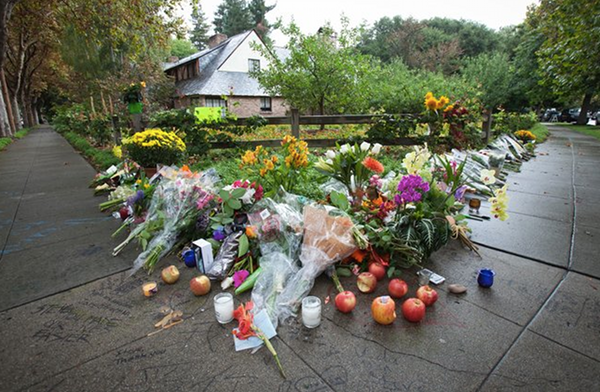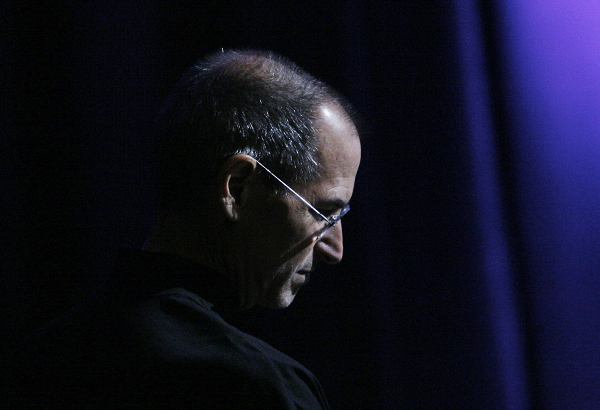Steve Jobs knew his time was short, focused on family first
Last updated
For the past few months, Jobs had been the recipient of numerous calls and attempted visits to his Palo Alto, Calif., home, as whispers spread of his worsening condition, The New York Times reported in an intimate piece on the Apple co-founder.
Steve Jobs had quietly shared with a few of his closest friends that he thought his time was becoming short. In the final days leading up to his death this past Wednesday, there was an incessant stream of phone calls from well-wishers.
Jobs' wife, Laurene, fielded most of the calls, and in the final weeks had confided in one caller that the former Apple chief was too weak to climb the stairs of his own house. She apologized to friends, saying that Jobs only had so much energy for farewells.
"He was aware that his time on earth was limited," close friend Dr. Dean Ornish said. "He wanted control of what he did with the choices that were left."
Most of that time was spent with his family, the report noted. When Jobs was able to make it to Apple, he would finish his work for the day and immediately return home for dinner with his wife and children.
Flowers and Apples left outside Steve Jobs' home in Palo Alto. Credit: Peter DaSilva/The New York Times.
Because of his extreme secrecy, there is little known as to how Jobs' wealth will be distributed. Many wealthy business leaders leave their estates to foundations or charity, but there has been no news on how Jobs planned to mete out his roughly $7 billion fortune.
"Everyone always wanted a piece of Steve," an acquaintance told the Times. "He created all these layers to protect himself from the fan boys and other peoples' expectations and the distractions that have destroyed so many other companies."
Jobs' home was surrounded by security guards in the months leading to his death, with two black SUV's blocking his driveway. On Thursday, the two vehicles were removed, to be replaced by flowers, candles and apples from visitors.
In a Time magazine interview, Jobs' biographer Walter Isaacson asked him why he had consented to a biography, given how private he was. Jobs replied, "I wanted my kids to know me," adding that he hadn't always been there for them and he wanted them to "know why and to understand" what he did.
Jobs gave some insight into his thoughts on "why" in his 2005 commencement speech at Stanford.
"Death is very likely the single best invention of life," he said. "It is life's change agent."
The benefit of death is that it allows you to not waste life living someone else's choices, Jobs went on to explain, adding that the most important thing to have is "the courage to follow your heart and intuition."
Near the end, Jobs turned his words into practice, choosing to concentrate on his family and those that depended on him.
"Steve's concerns these last few weeks were for people who depended on him: the people who worked for him at Apple and his four children and his wife," said Mona Simpson, Jobs' sister. "His tone was tenderly apologetic at the end. He felt terrible that he would have to leave us."
Little is known of Steve Jobs' personal life, and he wanted it that way. His obsession with secrecy continued until the day he died, but perhaps, in death, he will be better understood. His biography will be released in two weeks, and Time has released a special issue to commemorate the Apple co-founder.
Jobs' acquaintance, speaking to the Times in anonymity, may have put it best: "Once you're gone, you belong to the world."
 Mikey Campbell
Mikey Campbell















 Amber Neely
Amber Neely
 Thomas Sibilly
Thomas Sibilly
 AppleInsider Staff
AppleInsider Staff
 William Gallagher
William Gallagher
 Malcolm Owen
Malcolm Owen
 Christine McKee
Christine McKee










42 Comments
It's times like these that we see the true character of people. Because a true 'close friend' would still value Steve's desire for privacy even after his death and said nothing. Same for his family.
And we can see the type of respect different media had for him, while they get their piece of him.
Oh god, reading that... I'm so very saddened again. I'm going to start ballin' like a baby.
Just curious: since he died of a rare form of pancreatic cancer ( and we know most cancers are hereditary), does that mean his kids have a higher chance of contracting the same thing?
How sad.
Who we are, who we admire, who we view as heroes, says a lot about who we are as a society. I think it is kind of sad that Steve Jobs is considered such a hero. Has the technology he brought to us made our lives so much better? I don't think so. Yes, it is cool. Steve represents the false belief that we Americans love to hold on to "anyone can be Steve Jobs if they just work hard enough." How sad and untrue. Good for Steve. I just hope in those final moments he really had something that mattered to him beyond ego and wealth....it is a nice title for an article, but is it true?
Who we are, who we admire, who we view as heroes, says a lot about who we are as a society. I think it is kind of sad that Steve Jobs is considered such a hero. Has the technology he brought to us made our lives so much better? I don't think so. Yes, it is cool. Steve represents the false belief that we Americans love to hold on to "anyone can be Steve Jobs if they just work hard enough." How sad and untrue. Good for Steve. I just hope in those final moments he really had something that mattered to him beyond ego and wealth....it is a nice title for an article, but is it true?
[Deleted; not worth it, and don't feel up to it]